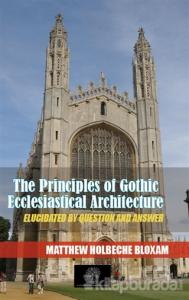The Principles of Gothic Ecclesiastical Architectur

“… Amongst the vestiges of antiquity which abound in this country, are the visible memorials of those nations which have succeeded one another in the occupancy of this island. To the age of our Celtic ancestors, the earliest possessors of its soil, is ascribed the erection of those altars and temples of all but primeval antiquity, the Cromlechs and Stone Circles which lie scattered over the land; and these are conceived to have been derived from the Phœnicians, whose merchants first introduced amongst the aboriginal Britons the arts of incipient civilization. Of these most ancient relics the prototypes appear, as described in Holy Writ, in the pillar raised at Bethel by Jacob, in the altars erected by the Patriarchs, and in the circles of stone set up by Moses at the foot of Mount Sinai, and by Joshua at Gilgal. Many of these structures, perhaps from their very rudeness, have survived the vicissitudes of time, whilst there scarce remains a vestige of the temples erected in this island by the Romans; yet it is from Roman edifices that we derive, and can trace by a gradual transition, the progress of that peculiar kind of architecture called Gothic, which presents in its later stages the most striking contrast that can be imagined to its original precursor…”
- Açıklama
“… Amongst the vestiges of antiquity which abound in this country, are the visible memorials of those nations which have succeeded one another in the occupancy of this island. To the age of our Celtic ancestors, the earliest possessors of its soil, is ascribed the erection of those altars and temples of all but primeval antiquity, the Cromlechs and Stone Circles which lie scattered over the land; and these are conceived to have been derived from the Phœnicians, whose merchants first introduced amongst the aboriginal Britons the arts of incipient civilization. Of these most ancient relics the prototypes appear, as described in Holy Writ, in the pillar raised at Bethel by Jacob, in the altars erected by the Patriarchs, and in the circles of stone set up by Moses at the foot of Mount Sinai, and by Joshua at Gilgal. Many of these structures, perhaps from their very rudeness, have survived the vicissitudes of time, whilst there scarce remains a vestige of the temples erected in this island by the Romans; yet it is from Roman edifices that we derive, and can trace by a gradual transition, the progress of that peculiar kind of architecture called Gothic, which presents in its later stages the most striking contrast that can be imagined to its original precursor…”
- Yorumlar
- Yorum yazBu kitaba henüz kimse yorum yapmamıştır.


